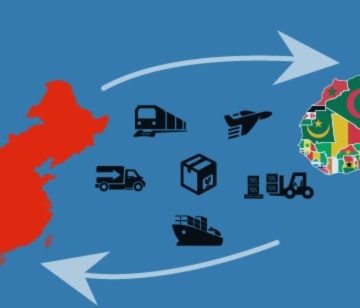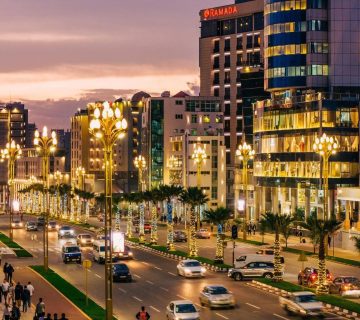After the second withdrawal of the United States from the 2015 Paris Agreement, the global efforts against climate change are facing increased challenges. As Africa is especially affected by the repercussions of climate change, African leaders and public are looking for new ways to adapt to and mitigate climate impacts on their communities and economies.
In this situation the European Union (EU)‘s actions are called inconsistent, contradictive and an expression of hypocrisy, as by the former President of Nigeria, Muhammadu Buhari. Especially the impacts of EU’s domestic green policies and agenda in Africa face criticism from leaders and civil society. This is despite its significant financial aid, including 3.47 billion Euros for Kenya‘s green energy transition, and EU‘s genuine commitment to climate action, environmental protection and sustainability, which offers avenues for improvement.
Climate Change and Actions in Africa
According to the Notre Dame Global Adaptation Initiative (ND-GAIN) Country Index, 47 countries worldwide are classified as very vulnerable to climate change, of which 30, such as the Democratic Republic of Congo, Eritrea and the Central African Republic, are located on the African continent and within the Greater Horn Region. A poll conducted between October 2nd and November 12th 2024 in Uganda and Ghana demonstrates the awareness and understanding of the African public of climate change with 71 percent of the participants stating that the impacts on climate change are significant and 66 percent feeling personally affected. In a separate poll conducted in Kenya by the HORN institute between April 17th and June 9th 2025, participants perceived environmental protection (90.6 percent) and a commitment to fight climate change (80 percent) as important prerequisites for future foreign cooperation in Kenya.
This is mirrored by the Nairobi Declaration in 2023, in which the African Head of States called for immediate climate actions. However, the African states are facing numerous challenges in the practical implementation of climate policies due to limited state authority and resources, as well as limited access to education. The impact of climate change and related repercussions are also increasing across Africa, with a notable example being the 2023 floods in Kenya resulting in an urgent demand for more climate action and new partners.
The EU is a strategic partner organization to Africa‘s fight against climate change, as emphasized in the common AU-EU motto “Two Unions, a joint vision“ and with the necessary financial resources. While EU‘s general commitment to climate action is perceived positively, it’s domestic measures are facing criticism from the African continent for their unintentional consequences for African communities and economies.
EU‘s Green Agenda
The first Ursula von der Leyen Commission (2019 – 2024) laid its focus on the promotion and development of green policies in the EU and worldwide. This included the introduction and implementation of several domestic policies such as the corporate sustainability due diligence directive (CSDDD), ensuring the compliance of human rights and environmental standards along the whole production line for products sold in the EU. Other measures include the Regulation on Deforestation-free Products, regulating the allowed amount of deforestation for new production, and the Carbon Border Adjustment Mechanism (CBAM), adding the environmental costs on to products entering the EU.
While these policies are meant to promote sustainable economic development in the EU, they are conversely perceived as an obstacle for the growth of African economies given their potential to impose additional costs and requirements on African products. A notable example is the CBAM criticized for burdening Africa‘s competitiveness with an estimated financial loss of about $25 billion due to a rise in the cost of the environmental impact of exports to the EU, while the CSDDD requires additional measures from the local production in Africa. Additionally, CBAM is perceived as an expression of a paternal approach, as the EU wants it to become an impetus for other regions to introduce their own carbon market.
Such repercussions are contrary to Africa‘s call for a just transition as they complicate the African efforts to balance climate actions with economic growth. This dynamic undermines EU‘s commitment to more climate actions worldwide, although EU‘s initial ambitions could provide the opportunity for constructive dialogue and mutual policy alignment between the EU and its African partners. Instead, the European measures are perceived as an expression of a lacking understanding of equality between Europe and Africa. The roots for this diversion can, among others, be traced to the lack of communication and examination about their domestic policies and their repercussions on other regions. These accusations of intransparency and hypocrisy in regards to domestic and international affairs of the EU add to the beginning self-isolation of the EU in international relations and its struggling position in the changing global order.
Way forward
As these dynamics are not intended by the EU, there are multiple avenues for improvement. The primary task should be to improve the communication and transparency of the EU’s domestic policies as well as their international implementation and repercussions. EU should not stop its climate efforts, but critically examine the unintended consequences of its transition and look for ways to mitigate them both domestically and abroad. By taking into account the fact, that suitable domestic approaches are not automatically beneficial for its global partners, the EU can additionally improve its current communication style.
Further appreciating Africa’s agency would mirror the common vision of“Two Unions, a joint vision“ and substantiate a renewed EU-Africa partnership focused on mutual efforts to combat climate change. Priority should be to build up the African financial and technological capacities to both mitigate and adapt to climate change. By fulfilling the call of the African public to take their interests and needs into account and enhancing global cooperation the EU can position itself as an appreciated partner. The perception of a partner, who is cooperating with Africa on an equal basis, can strengthen both EU‘s international stance and the global climate actions.
Jakob Dehner is a Research Intern at the Horn institute.
Photo Credits: European Union in Kenya



